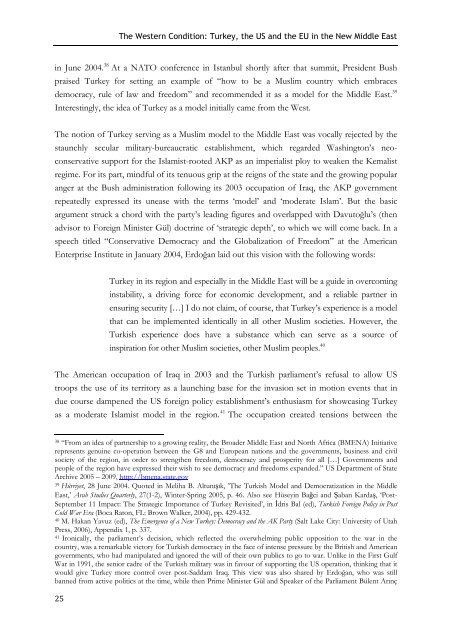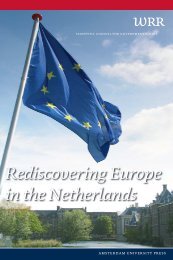The Western Condition - St Antony's College - University of Oxford
The Western Condition - St Antony's College - University of Oxford
The Western Condition - St Antony's College - University of Oxford
Create successful ePaper yourself
Turn your PDF publications into a flip-book with our unique Google optimized e-Paper software.
<strong>The</strong> <strong>Western</strong> <strong>Condition</strong>: Turkey, the US and the EU in the New Middle East<br />
in June 2004. 38 At a NATO conference in Istanbul shortly after that summit, President Bush<br />
praised Turkey for setting an example <strong>of</strong> “how to be a Muslim country which embraces<br />
democracy, rule <strong>of</strong> law and freedom” and recommended it as a model for the Middle East. 39<br />
Interestingly, the idea <strong>of</strong> Turkey as a model initially came from the West.<br />
<strong>The</strong> notion <strong>of</strong> Turkey serving as a Muslim model to the Middle East was vocally rejected by the<br />
staunchly secular military-bureaucratic establishment, which regarded Washington’s neoconservative<br />
support for the Islamist-rooted AKP as an imperialist ploy to weaken the Kemalist<br />
regime. For its part, mindful <strong>of</strong> its tenuous grip at the reigns <strong>of</strong> the state and the growing popular<br />
anger at the Bush administration following its 2003 occupation <strong>of</strong> Iraq, the AKP government<br />
repeatedly expressed its unease with the terms ‘model’ and ‘moderate Islam’. But the basic<br />
argument struck a chord with the party’s leading figures and overlapped with Davutoğlu’s (then<br />
advisor to Foreign Minister Gül) doctrine <strong>of</strong> ‘strategic depth’, to which we will come back. In a<br />
speech titled “Conservative Democracy and the Globalization <strong>of</strong> Freedom” at the American<br />
Enterprise Institute in January 2004, Erdoğan laid out this vision with the following words:<br />
Turkey in its region and especially in the Middle East will be a guide in overcoming<br />
instability, a driving force for economic development, and a reliable partner in<br />
ensuring security […] I do not claim, <strong>of</strong> course, that Turkey’s experience is a model<br />
that can be implemented identically in all other Muslim societies. However, the<br />
Turkish experience does have a substance which can serve as a source <strong>of</strong><br />
inspiration for other Muslim societies, other Muslim peoples. 40<br />
<strong>The</strong> American occupation <strong>of</strong> Iraq in 2003 and the Turkish parliament’s refusal to allow US<br />
troops the use <strong>of</strong> its territory as a launching base for the invasion set in motion events that in<br />
due course dampened the US foreign policy establishment’s enthusiasm for showcasing Turkey<br />
as a moderate Islamist model in the region. 41 <strong>The</strong> occupation created tensions between the<br />
38 “From an idea <strong>of</strong> partnership to a growing reality, the Broader Middle East and North Africa (BMENA) Initiative<br />
represents genuine co-operation between the G8 and European nations and the governments, business and civil<br />
society <strong>of</strong> the region, in order to strengthen freedom, democracy and prosperity for all […] Governments and<br />
people <strong>of</strong> the region have expressed their wish to see democracy and freedoms expanded.” US Department <strong>of</strong> <strong>St</strong>ate<br />
Archive 2005 – 2009, http://bmena.state.gov<br />
39 Hürriyet, 28 June 2004. Quoted in Meliha B. Altunışık, ’<strong>The</strong> Turkish Model and Democratization in the Middle<br />
East,’ Arab <strong>St</strong>udies Quarterly, 27(1-2), Winter-Spring 2005, p. 46. Also see Hüseyin Bağci and Şaban Kardaş, ‘Post-<br />
September 11 Impact: <strong>The</strong> <strong>St</strong>rategic Importance <strong>of</strong> Turkey Revisited’, in İdris Bal (ed), Turkish Foreign Policy in Post<br />
Cold War Era (Boca Raton, FL: Brown Walker, 2004), pp. 429-432.<br />
40 M. Hakan Yavuz (ed), <strong>The</strong> Emergence <strong>of</strong> a New Turkey: Democracy and the AK Party (Salt Lake City: <strong>University</strong> <strong>of</strong> Utah<br />
Press, 2006), Appendix 1, p. 337.<br />
41 Ironically, the parliament’s decision, which reflected the overwhelming public opposition to the war in the<br />
country, was a remarkable victory for Turkish democracy in the face <strong>of</strong> intense pressure by the British and American<br />
governments, who had manipulated and ignored the will <strong>of</strong> their own publics to go to war. Unlike in the First Gulf<br />
War in 1991, the senior cadre <strong>of</strong> the Turkish military was in favour <strong>of</strong> supporting the US operation, thinking that it<br />
would give Turkey more control over post-Saddam Iraq. This view was also shared by Erdoğan, who was still<br />
banned from active politics at the time, while then Prime Minister Gül and Speaker <strong>of</strong> the Parliament Bülent Arınç<br />
25

















